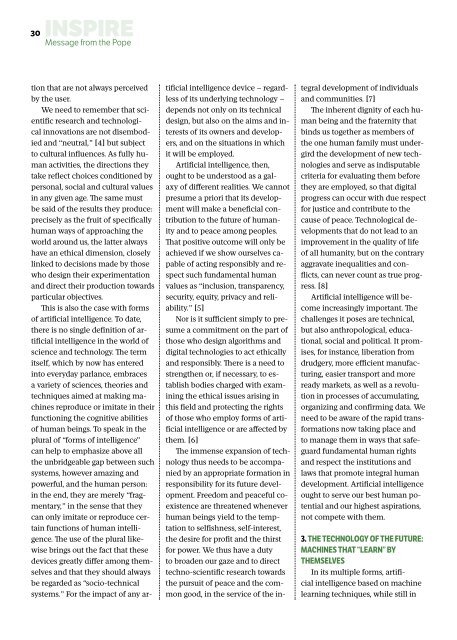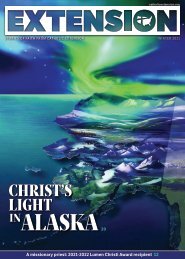Extension magazine - Spring 2024
What will be the impact of artificial intelligence on our world? Our article on page 24 considers how AI can assist as a helpful tool for the betterment of humanity, as well as its potential drawbacks. You will see images generated by a new AI system, Midjourney, that we prompted to create the cover of this magazine as well as vivid religious art. Also included is Pope Francis' 2024 address: "Artificial Intelligence and Peace."
What will be the impact of artificial intelligence on our world? Our article on page 24 considers how AI can assist as a helpful tool for the betterment of humanity, as well as its potential drawbacks. You will see images generated by a new AI system, Midjourney, that we prompted to create the cover of this magazine as well as vivid religious art. Also included is Pope Francis' 2024 address: "Artificial Intelligence and Peace."
You also want an ePaper? Increase the reach of your titles
YUMPU automatically turns print PDFs into web optimized ePapers that Google loves.
30 INSPIRE<br />
Message from the Pope<br />
<strong>Extension</strong> | <strong>Spring</strong> <strong>2024</strong> 31<br />
5. BURNING ISSUES FOR ETHICS<br />
In the future, the reliability of an<br />
applicant for a mortgage, the suitability<br />
of an individual for a job, the<br />
possibility of recidivism on the part<br />
of a convicted person, or the right to<br />
receive political asylum or social assistance<br />
could be determined by artificial<br />
intelligence systems. The lack<br />
of different levels of mediation that<br />
these systems introduce is particularly<br />
exposed to forms of bias and<br />
discrimination: systemic errors can<br />
easily multiply, producing not only<br />
injustices in individual cases but<br />
also, due to the domino effect, real<br />
forms of social inequality.<br />
At times too, forms of artificial<br />
intelligence seem capable of influencing<br />
individuals’ decisions by option<br />
that are not always perceived<br />
by the user.<br />
We need to remember that scientific<br />
research and technological<br />
innovations are not disembodied<br />
and “neutral,” [4] but subject<br />
to cultural influences. As fully human<br />
activities, the directions they<br />
take reflect choices conditioned by<br />
personal, social and cultural values<br />
in any given age. The same must<br />
be said of the results they produce:<br />
precisely as the fruit of specifically<br />
human ways of approaching the<br />
world around us, the latter always<br />
have an ethical dimension, closely<br />
linked to decisions made by those<br />
who design their experimentation<br />
and direct their production towards<br />
particular objectives.<br />
This is also the case with forms<br />
of artificial intelligence. To date,<br />
there is no single definition of artificial<br />
intelligence in the world of<br />
science and technology. The term<br />
itself, which by now has entered<br />
into everyday parlance, embraces<br />
a variety of sciences, theories and<br />
techniques aimed at making machines<br />
reproduce or imitate in their<br />
functioning the cognitive abilities<br />
of human beings. To speak in the<br />
plural of “forms of intelligence”<br />
can help to emphasize above all<br />
the unbridgeable gap between such<br />
systems, however amazing and<br />
powerful, and the human person:<br />
in the end, they are merely “fragmentary,”<br />
in the sense that they<br />
can only imitate or reproduce certain<br />
functions of human intelligence.<br />
The use of the plural likewise<br />
brings out the fact that these<br />
devices greatly differ among themselves<br />
and that they should always<br />
be regarded as “socio-technical<br />
systems.” For the impact of any artificial<br />
intelligence device – regardless<br />
of its underlying technology –<br />
depends not only on its technical<br />
design, but also on the aims and interests<br />
of its owners and developers,<br />
and on the situations in which<br />
it will be employed.<br />
Artificial intelligence, then,<br />
ought to be understood as a galaxy<br />
of different realities. We cannot<br />
presume a priori that its development<br />
will make a beneficial contribution<br />
to the future of humanity<br />
and to peace among peoples.<br />
That positive outcome will only be<br />
achieved if we show ourselves capable<br />
of acting responsibly and respect<br />
such fundamental human<br />
values as “inclusion, transparency,<br />
security, equity, privacy and reliability.”<br />
[5]<br />
Nor is it sufficient simply to presume<br />
a commitment on the part of<br />
those who design algorithms and<br />
digital technologies to act ethically<br />
and responsibly. There is a need to<br />
strengthen or, if necessary, to establish<br />
bodies charged with examining<br />
the ethical issues arising in<br />
this field and protecting the rights<br />
of those who employ forms of artificial<br />
intelligence or are affected by<br />
them. [6]<br />
The immense expansion of technology<br />
thus needs to be accompanied<br />
by an appropriate formation in<br />
responsibility for its future development.<br />
Freedom and peaceful coexistence<br />
are threatened whenever<br />
human beings yield to the temptation<br />
to selfishness, self-interest,<br />
the desire for profit and the thirst<br />
for power. We thus have a duty<br />
to broaden our gaze and to direct<br />
techno-scientific research towards<br />
the pursuit of peace and the common<br />
good, in the service of the integral<br />
development of individuals<br />
and communities. [7]<br />
The inherent dignity of each human<br />
being and the fraternity that<br />
binds us together as members of<br />
the one human family must undergird<br />
the development of new technologies<br />
and serve as indisputable<br />
criteria for evaluating them before<br />
they are employed, so that digital<br />
progress can occur with due respect<br />
for justice and contribute to the<br />
cause of peace. Technological developments<br />
that do not lead to an<br />
improvement in the quality of life<br />
of all humanity, but on the contrary<br />
aggravate inequalities and conflicts,<br />
can never count as true progress.<br />
[8]<br />
Artificial intelligence will become<br />
increasingly important. The<br />
challenges it poses are technical,<br />
but also anthropological, educational,<br />
social and political. It promises,<br />
for instance, liberation from<br />
drudgery, more efficient manufacturing,<br />
easier transport and more<br />
ready markets, as well as a revolution<br />
in processes of accumulating,<br />
organizing and confirming data. We<br />
need to be aware of the rapid transformations<br />
now taking place and<br />
to manage them in ways that safeguard<br />
fundamental human rights<br />
and respect the institutions and<br />
laws that promote integral human<br />
development. Artificial intelligence<br />
ought to serve our best human potential<br />
and our highest aspirations,<br />
not compete with them.<br />
3. THE TECHNOLOGY OF THE FUTURE:<br />
MACHINES THAT “LEARN” BY<br />
THEMSELVES<br />
In its multiple forms, artificial<br />
intelligence based on machine<br />
learning techniques, while still in<br />
its pioneering phases, is already introducing<br />
considerable changes to<br />
the fabric of societies and exerting<br />
a profound influence on cultures,<br />
societal behaviours and peacebuilding.<br />
Developments such as machine<br />
learning or deep learning, raise<br />
questions that transcend the realms<br />
of technology and engineering, and<br />
have to do with the deeper understanding<br />
of the meaning of human<br />
life, the construction of knowledge,<br />
and the capacity of the mind to attain<br />
truth.<br />
The ability of certain devices to<br />
produce syntactically and semantically<br />
coherent texts, for example,<br />
is no guarantee of their reliability.<br />
They are said to “hallucinate,”<br />
that is, to create statements that at<br />
first glance appear plausible but are<br />
unfounded or betray biases. This<br />
poses a serious problem when artificial<br />
intelligence is deployed in<br />
campaigns of disinformation that<br />
spread false news and lead to a<br />
growing distrust of the communications<br />
media. Privacy, data ownership<br />
and intellectual property are<br />
other areas where these technologies<br />
engender grave risks. To which<br />
we can add other negative consequences<br />
of the misuse of these<br />
technologies, such as discrimination,<br />
interference in elections, the<br />
rise of a surveillance society, digital<br />
exclusion and the exacerbation of<br />
an individualism increasingly disconnected<br />
from society. All these<br />
factors risk fueling conflicts and<br />
hindering peace.<br />
4. THE SENSE OF LIMIT IN THE<br />
TECHNOCRATIC PARADIGM<br />
Our world is too vast, varied and<br />
complex ever to be fully known<br />
and categorized. The human mind<br />
can never exhaust its richness, even<br />
with the aid of the most advanced<br />
algorithms. Such algorithms do not<br />
offer guaranteed predictions of the<br />
future, but only statistical approximations.<br />
Not everything can be<br />
predicted, not everything can be<br />
calculated; in the end, “realities are<br />
greater than ideas.” [9] No matter<br />
how prodigious our calculating<br />
power may be, there will always be<br />
an inaccessible residue that evades<br />
any attempt at quantification.<br />
In addition, the vast amount of<br />
data analyzed by artificial intelligences<br />
is in itself no guarantee of<br />
impartiality. When algorithms extrapolate<br />
information, they always<br />
run the risk of distortion, replicating<br />
the injustices and prejudices of<br />
the environments where they originate.<br />
The faster and more complex<br />
they become, the more difficult it<br />
proves to understand why they produced<br />
a particular result.<br />
“Intelligent” machines may perform<br />
the tasks assigned to them<br />
with ever greater efficiency, but the<br />
purpose and the meaning of their<br />
operations will continue to be determined<br />
or enabled by human beings<br />
possessed of their own universe<br />
of values. There is a risk that<br />
the criteria behind certain decisions<br />
will become less clear, responsibility<br />
for those decisions<br />
concealed, and producers enabled<br />
to evade their obligation to act for<br />
the benefit of the community. In<br />
some sense, this is favoured by the<br />
technocratic system, which allies<br />
the economy with technology and<br />
privileges the criterion of efficiency,<br />
tending to ignore anything unrelated<br />
to its immediate interests. [10]<br />
This should lead us to reflect on<br />
something frequently overlooked<br />
in our current technocratic and efficiency-oriented<br />
mentality, as it is<br />
decisive for personal and social development:<br />
the “sense of limit.”<br />
Human beings are, by definition,<br />
mortal; by proposing to overcome<br />
every limit through technology, in<br />
an obsessive desire to control everything,<br />
we risk losing control over<br />
ourselves; in the quest for an absolute<br />
freedom, we risk falling into<br />
the spiral of a “technological dictatorship.”<br />
Recognizing and accepting<br />
our limits as creatures is an indispensable<br />
condition for reaching,<br />
or better, welcoming fulfilment as<br />
a gift. In the ideological context of<br />
a technocratic paradigm inspired<br />
by a Promethean presumption of<br />
self-sufficiency, inequalities could<br />
grow out of proportion, knowledge<br />
and wealth accumulate in the hands<br />
of a few, and grave risks ensue for<br />
democratic societies and peaceful<br />
coexistence. [11]














